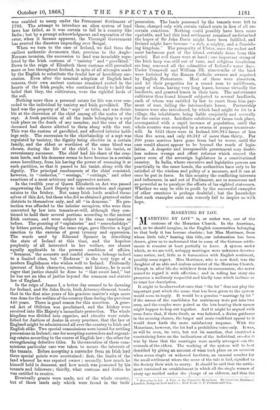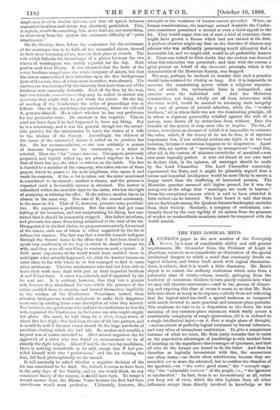MARRYING BY LOT.
ASARRYING BY LOT" is, or rather was, one of the customs of the Moravian Church. In the American, and, as we should imagine, in the English communities belonging to that body it has become obsolete ; but Miss Mortimer, from whose little tale,* bearing this title, our information has been drawn, gives us to understand that in some of the German settle- ments it remains at least partially in force. A system under which, as we are told, unhappy marriages were unknown deserves some notice, and, little as it harmonizes with English sentiment, possibly some regret. Miss Mortimer, who is now dead, was the daughter of an able and zealous minister of the Moravian Church. Though in after life she withdrew from its communion, she never ceased to regard it with affection ; and in telling her story she preserves a uniformly respectful and kindly tone which inclines us to trust her description.
It ought to be observed at once that "the lot" does not play the important part which the name that has been given to the system would seem to imply. It would be a genuine "marriage by lot" if the names of the candidates for matrimony were put into two urns, and the couples were paired as the lots bearing their names might happen to leap out together. And it might be argued with some force that, if there dwelt, as was believed, a divine guidance in the seeming chance, the larger and more confident appeal to it would draw forth the more satisfactory response. With the Moravians, however, the lot had a prohibitive voice only. It was, as will be seen, its veto, but not its sanction, that exercised a constraining force on the inclinations of the individual, or—for it was by these that the marriages were mostly arranged—on the counsels of the elders. The working of the system will be hest described by giving an account of what took place on an occasion when seven single or widowed brethren, an unusual number for the small settlement where the scene of the tale is laid, signified to the Society their wish to marry. It should be said that the settle- ment contained an establishment in which all the single women of every age resided under the charge of an elderess, and that the • Marrying by Lot. A Tale of the Primitive Moravitma. By Charlotte Mortimer. London, Sampson Low and Co.; New York, U. P. Putnam and Son.
single men lived in similar fashion, and that all speech between unmarried brethren and sisters was absolutely prohibited. This, it is plain, would do something, but, as we shall see, not everything, to clear away from the system the enormous difficulty of "prior attachments."
On the Sunday, then, before the conference for the settlement of the marriages was to be held, all the unmarried sisters, dressed in their most becoming attire, were in their place at church. The rule which forbade the interchange of a glance between the two classes of worshippers was tacitly repealed for the day. Both parties used their liberty. It was observed that the looks of the seven brethren ranged over the whole company of sisters, but that the sisters concentrated their attention upon the five bridegrooms (out of the seven, two, of whom more hereafter, were absent). The excitement was increased by the discovery that more than one of the brethren were unusually desirable. Each of the five, by the way, bad two friends, nomenclatores they may be called, to answer any questions they might wish to put about the sisters. On the day of meetiug of the Conference the order of proceedings was as follows. One of the candidates for matrimony, whom we will call A, presents himself. He is asked whether he has any preference for any particular sister. He answers in the negative. This he need not have done if he had happened to have any liking. But he is a missionary, and it was the general though not the invari- able practice for the missionaries to leave the choice of a wife to the wisdom of the Society. Accordingly, the elderess of the house of the unmarried sisters is called on to produce her list. On her recommendation, — she was evidently a person of immense importance in the community, — a sister is selected. Then the "lot "comes into use. Two papers, previously prepared, and tightly rolled up, are placed together in a box. One of these has yes, the other no written on the inside. The box is handed to a member of the company, who takes out one of these papers, which he passes to his next neighbour, who opens it and reads its contents. If the no lot is taken out the sister mentioned is considered to be vetoed ; another is chosen, and the process is repeated until a favourable answer is obtained. The matter is submitted within the next few days to the sister, who has the right of accepting or refusing the offer. If she refuses, another has to be chosen in the same way. The case of B, the second missionary, is the same as A's. That of C, however, presents some peculiari- ties. He expresses a preference. But the sister had got some inkling of his intention, and not reciprocating his liking, had con- trived that it should be summarily stopped. Her father interferes, and prevents her name from being submitted to the trial of the lot. Disappointed in his first choice, he proposes successively for several of the sisters, each one of whom is either negatived by the lot or refuses her consent. The fact was that a terrible rumour had gone through the Sisters' house to the effect that C had been heard to speak very confidently of the way in which he should manage his wife, and they were all unwilling to venture on such a tyrant. A little more experience of the world would have enabled them to anticipate what actually happened, viz., that the boaster became an utter slave to the wife whom he at last managed to find in some other settlement. The two missionaries who had not been able to leave their work were dealt with just as their impartial brethren A and B had been. A sister was selected, and if approved by the Jot sent out. It is evident, however, that they ran a greater risk, because they abandoned the veto which the presence of the others enabled them to exercise, and trusted themselves implicitly to the wisdom of the Conference. Sometimes, indeed, these absentee bridegrooms would endeavour to make their happiness more sure by sending home some description of what they wanted. For instance, one gentleman who had had the misfortune to lose his wife requested the Conference to find some one who might supply her place. She must, he told them, be a short, dumpy sister, of about five feet high ; that had been the size of his late partner, and it would be well if the new coiner should fit the large wardrobe of excellent clothing which she had left. So modest and sensible a request was of course attended to. After several negatives the lot approved of a sister who was found on measurement to be of exactly the right height. About F and G, the two lay candidates, there is nothing remarkable to be said, except that F had pro- vided himself with two " preferences," and the lot vetoing the first, fell back philosophically on the second.
It will naturally be asked whether a negative decision of the lot was considered to be final. So, indeed, it seems to have been in the early days of the Society, and so, one would think, on any consistent theory of the custom, it should have been. To tempt a second answer from the Divine Voice because the first had been unwelcome would seem profanity. Ultimately, however, the strength or the weakness of human nature prevailed. When, on human considerations, the marriage seemed desirable the Confer- ence sometimes permitted a second or even a third appeal to the lot. They would argue that out of such a trial of constancy there might have grown a fitness which had not existed at the first. A profane observer might say that on the doctrine of chances any admirer who was sufficiently persevering would ultimately find a favourable lot, and we might add, would in all probability deserve it. There can indeed be little doubt that the custom was doomed when this relaxation was permitted ; and that with the custom a great protest on behalf of the theocratic principle, which is the characteristic of the Moravian Society, was dropped.
We may, perhaps, be inclined to wonder that such a practice should have retained its vitality so long. But it is impossible to measure the constraining power which a religious organiza- tion, of which the enthusiastic force is unimpaired, can exercise over the individual will. And the Moravian communities, not being wholly cut off from intercourse with the outer world, would be assisted in retaining their integrity by a sort of process of natural selection, while the "weaker brethren," all in whom faith was not the dominating principle, all in whom a vigorous personality rebelled against the rule of a system, were drawn off by attractions from without. Into the benefits of the system it may seem idle to inquire. The lot, of course, introduces an element of which it is impossible to estimate the value, which, if the theory of its use be true, is of supreme importance but, if our ordinary notions are right, is at the best harmless, because it sometimes happens to be inoperative. Apart from this, no system of "marriage by arrangement "—and this, after all, is the custom of nineteen-twentieths of mankind—was ever more logically perfect. A wise old friend of our own used to declare that, in his opinion, all marriages should be made by the Lord Chancellor. The Lord Chancellor concretely represented the State, and it might be plausibly argued that a serene and impartial intelligence would be more likely to secure a happy result than the chaffering of interested parents. The Moravian practice assumed still higher ground, for it was the acting out of the adage that "marriages are made in heaven." From the exceptional success which is said to have attended it little indeed can be inferred. We have heard it said that there are no bankrupts among the Quakers because bankruptcy excludes from their Society. Similarly, a company of enthusiasts, con- tinually freed by the very rigidity of its system from the presence of weaker or insubordinate members, cannot be compared with the world outside.



































 Previous page
Previous page